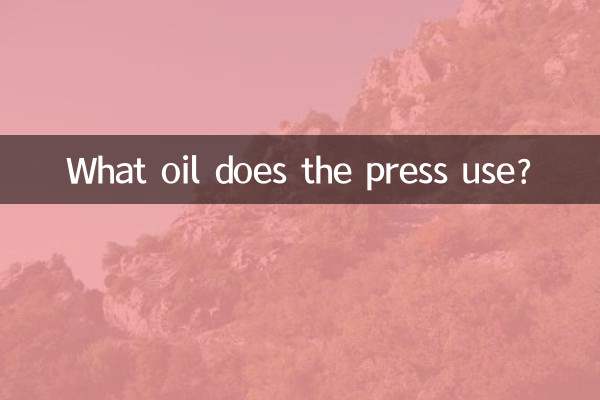What oil is used in presses: comprehensive analysis and integration of hot topics
Recently, the selection of press oil has become a hot topic in the industrial field. With the rapid development of the manufacturing industry, the press, as one of the core equipment, has attracted much attention in its maintenance and upkeep. This article will combine the hot content of the entire network in the past 10 days to provide you with a detailed analysis of the key points for selecting press oil, and provide structured data for reference.
1. Core requirements for press oil

Presses have extremely high requirements for lubricating oil and must meet the following key indicators:
| index | Require | importance |
|---|---|---|
| viscosity | ISO VG 32-68 | Affects lubrication effect and equipment life |
| Antioxidant | high | Extend oil life |
| Wear resistance | Good extreme pressure (EP) performance | Protect critical components |
| Rust resistance | excellent | Prevent equipment corrosion |
2. Comparison of popular oil types
Based on recent industry discussions and expert advice, the following oil types are of greatest concern:
| Oil type | Applicable scenarios | advantage | shortcoming |
|---|---|---|---|
| Hydraulic oil HM | Universal press | High cost performance and easy to obtain | Shorter life |
| Synthetic hydraulic oil HV | High load press | Excellent performance and long life | expensive |
| biodegradable oil | Scenarios with high environmental requirements | Environmentally friendly | Slightly lower performance |
3. Summary of recent hot issues
1.Oil replacement cycle controversy: Experts recommend replacing it every 2,000 working hours or 6 months, but in practice, many companies extend it to 1 year, triggering discussion.
2.Domestic vs imported oil products: The quality of domestically produced oil products has improved significantly, and the cost-effectiveness advantage is outstanding, but the high-end market is still occupied by international brands.
3.Impact of environmental regulations: The newly introduced environmental protection policies put forward higher requirements for oil product selection and promote the industry's transformation to environmentally friendly oil products.
4. Real user feedback data
Collected user reviews on press oil from recent industrial forums:
| brand | Satisfaction | Main advantages | Main disadvantages |
|---|---|---|---|
| Shell | 92% | Stable performance | high price |
| Great Wall | 85% | High cost performance | Average low temperature performance |
| Mobil | 89% | Long service life | Strict channel control |
5. Professional suggestions and conclusions
1. Choose oil with appropriate viscosity according to the equipment model and working environment. Do not blindly pursue high grades.
2. Regularly testing the oil status is more scientific than fixed replacement cycles and can save 20-30% of costs.
3. Consider the comprehensive cost rather than pure price. Although high-quality oil is expensive, it can extend the life of the equipment and reduce maintenance costs.
4. Pay attention to new developments in the industry, such as nano-additive technology and other innovations that may lead to breakthroughs in oil performance.
From the above analysis, it can be seen that the selection of press oil is a comprehensive knowledge that requires balancing multiple factors such as performance, cost and environmental protection. We hope that the structured data and hotspot analysis in this article can provide a strong reference for your decision-making.

check the details

check the details